
Roald Hoffmann is a Polish-American theoretical chemist who won the 1981 Nobel Prize in Chemistry. He has also published plays and poetry. He is the Frank H. T. Rhodes Professor of Humane Letters, Emeritus, at Cornell University, in Ithaca, New York.

The American Chemical Society (ACS) is a scientific society based in the United States that supports scientific inquiry in the field of chemistry. Founded in 1876 at New York University, the ACS currently has more than 155,000 members at all degree levels and in all fields of chemistry, chemical engineering, and related fields. It is one of the world's largest scientific societies by membership. The ACS is a 501(c)(3) non-profit organization and holds a congressional charter under Title 36 of the United States Code. Its headquarters are located in Washington, D.C., and it has a large concentration of staff in Columbus, Ohio.
George Claude Pimentel was the inventor of the chemical laser. He also developed the technique of matrix isolation in low-temperature chemistry. In theoretical chemistry, he proposed the three-center four-electron bond which is now accepted as the best simple model of hypervalent molecules. In the late 1960s, Pimentel led the University of California team that designed the infrared spectrometer for the Mars Mariner 6 and 7 missions that analyzed the surface and atmosphere of Mars.
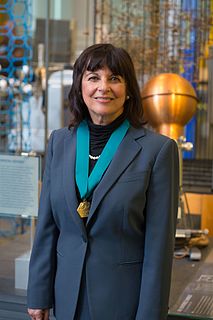
Jacqueline K. Barton, is an American chemist. She worked as a Professor of Chemistry at Hunter College (1980–82), and at Columbia University (1983–89) before joining the California Institute of Technology. In 1997 she became the Arthur and Marian Hanisch Memorial Professor of Chemistry and from 2009 to 2019, the Norman Davidson Leadership Chair of the Division of Chemistry and Chemical Engineering at Caltech. She currently is the John G. Kirkwood and Arthur A. Noyes Professor of Chemistry.

Armand Paul Alivisatos is an American chemist who serves as the 14th president of the University of Chicago. He is a pioneer in nanomaterials development and an authority on the fabrication of nanocrystals and their use in biomedical and renewable energy applications. He was ranked fifth among the world's top 100 chemists for the period 2000–2010 in the list released by Thomson Reuters.
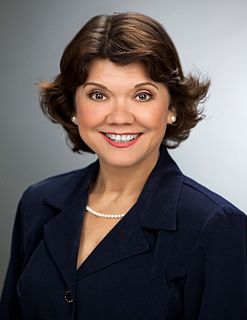
Donna J. Nelson is an American chemist and professor of chemistry at the University of Oklahoma. Nelson specializes in organic chemistry, which she both researches and teaches. Nelson served as a science advisor to the AMC television show Breaking Bad. She was the 2016 President of the American Chemical Society (ACS) with her presidential activities focusing on and guided by communities in chemistry. Nelson's research focused on five primary topics, generally categorized in two areas, Scientific Research and America's Scientific Readiness. Within Scientific Research, Nelson's topics have been on mechanistic patterns in alkene addition reactions and on Single-Walled Carbon Nanotube (SWCNT) functionalization and analysis, yielding the first COSY NMR spectrum of covalently functionalized SWCNTs in solution. Under America's Scientific Readiness, she focuses on science education and impacting science by considering its communities; this includes classroom innovations and correcting organic chemistry textbook inaccuracies, on ethnic and gender diversity among highly ranked science departments of research universities, and on improving the image and presentation of science and scientists to the public.
Tobin Jay Marks is the Vladimir N. Ipatieff Professor of Catalytic Chemistry, Professor of Material Science and Engineering, Professor of Chemical and Biological Engineering, and Professor of Applied Physics at Northwestern University in Evanston, Illinois. Among the themes of his research are synthetic organo-f-element and early-transition metal organometallic chemistry, polymer chemistry, materials chemistry, homogeneous and heterogeneous catalysis, molecule-based photonic materials, superconductivity, metal-organic chemical vapor deposition, and biological aspects of transition metal chemistry.

Carolyn Ruth Bertozzi is an American chemist and Nobel laureate, known for her wide-ranging work spanning both chemistry and biology. She coined the term "bioorthogonal chemistry" for chemical reactions compatible with living systems. Her recent efforts include synthesis of chemical tools to study cell surface sugars called glycans and how they affect diseases such as cancer, inflammation, and viral infections like COVID-19. At Stanford University, she holds the Anne T. and Robert M. Bass Professorship in the School of Humanities and Sciences. Bertozzi is also an Investigator at the Howard Hughes Medical Institute (HHMI) and is the former Director of the Molecular Foundry, a nanoscience research center at Lawrence Berkeley National Laboratory.
Harden M. McConnell was an American physical chemist. His many awards included the National Medal of Science and the Wolf Prize, and he was elected to the National Academy of Science."

Krzysztof "Kris" Matyjaszewski is a Polish-American chemist. He is the J.C. Warner Professor of the Natural Sciences at the Carnegie Mellon University Matyjaszewski is best known for the discovery of atom transfer radical polymerization (ATRP), a novel method of polymer synthesis that has revolutionized the way macromolecules are made.

The Science History Institute is an institution that preserves and promotes understanding of the history of science. Located in Philadelphia, Pennsylvania, it includes a library, museum, archive, research center and conference center.
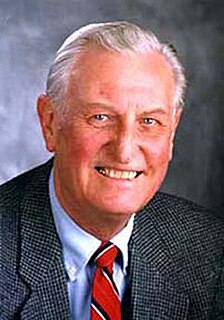
Otto Vogl was an American chemist, polymer scientist, and educator.

Younan Xia is a Chinese-American chemist, materials scientist, and bioengineer. He is the Brock Family Chair and Georgia Research Alliance (GRA) Eminent Scholar in Nanomedicine in the Wallace H. Coulter Department of Biomedical Engineering, with joint appointments in the School of Chemistry & Biochemistry, the School of Chemical & Biomolecular Engineering, and Parker H. Petit Institute for Bioengineering & Bioscience at the Georgia Institute of Technology.
Melanie Sarah Sanford is an American chemist, currently the Moses Gomberg Distinguished University Professor of Chemistry and Arthur F. Thurnau Professor of Chemistry at the University of Michigan. She is a Fellow for the American Association for the Advancement of Science, and was elected a member of the National Academy of Sciences and the American Academy of Arts and Sciences in 2016. She has served as an executive editor of the Journal of the American Chemical Society since 2021, having been an associate editor of the since 2014.
Allison A. Campbell is an American chemist who is known in the areas of biomineralization, biomimetics and biomaterials for her innovative work on bioactive coatings for medical implants. She is the acting associate laboratory director for the Earth and Biological Sciences Directorate at the Pacific Northwest National Laboratory (PNNL) of the Department of Energy. She previously served as director of the Environmental Molecular Sciences Laboratory (EMSL) at PNNL. She was elected as the 2017 president of the American Chemical Society (ACS).
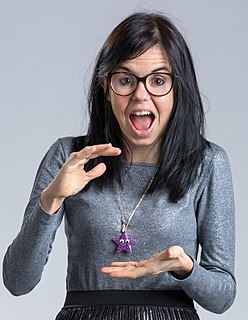
Jessica Alice Feinmann Wade is a British physicist in the Blackett Laboratory at Imperial College London, specialising in Raman spectroscopy. Her research investigates polymer-based organic light emitting diodes (OLEDs). Her public engagement work in science, technology, engineering, and mathematics (STEM) advocates for women in physics as well as tackling systemic biases such as gender and racial bias on Wikipedia.
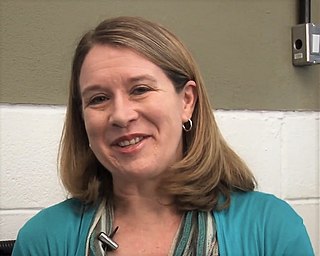
Christy Lynn Haynes is a chemist at the University of Minnesota. She works at the interface of analytical, biological, and nanomaterials chemistry.
Nina Matheny Roscher (1938—2001) was an American chemist and advocate for women and minorities in science. She also researched the history of women in chemistry, publishing the book Women Chemists (1995). She served as professor and chair of the chemistry department at American University in Washington, D.C. She received the ACS Award for Encouraging Women into Careers in the Chemical Sciences (1996) and the Presidential Award for Excellence in Science, Mathematics and Engineering Mentoring (1998).
Kimberly A. Prather is an American scientist who is an Atmospheric Chemist, Distinguished Chair in Atmospheric Chemistry, and a Distinguished Professor at the Scripps Institution of Oceanography and Department of Chemistry and Biochemistry at UC San Diego. Her work focuses on how humans are influencing the atmosphere and climate. In 2019, she was elected a member of the National Academy of Engineering for technologies that transformed understanding of aerosols and their impacts on air quality, climate, and human health. In 2020, she was elected as a member of the National Academy of Sciences. She is also an elected Fellow of the American Geophysical Union, the American Association for the Advancement of Science, and the American Academy of Arts and Sciences.
Ingrid Montes, also known as Ingrid del Carmen Montes González is a full professor in the Department of Chemistry at the University of Puerto Rico, Río Piedras campus. She attained tenure in 1998. Her research focus is on chemical education and organometallic chemistry. Montes has been Director-at-large at the American Chemical Society (ACS) since 2013. Montes founded the "Festival de Química" in 2005, this program was then adopted by the ACS in 2010.











